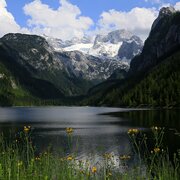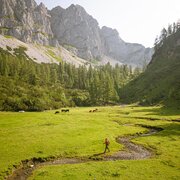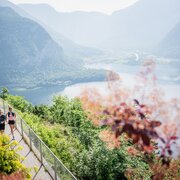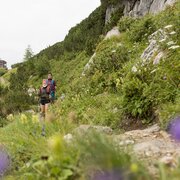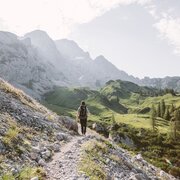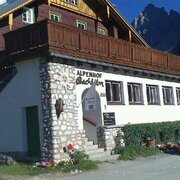Dachstein Circular Hiking Trail
Tour description
This 8-day hike on and around the Dachstein will lead you through:
- Sharp rocks over green alpine pastures
- Bizarre edges and enormous towering rock walls
- Glacier ice, limestone rocks,
- Lonely high-alpine terrain, virgin forests and rewarding summits
- Mysterious karst springs and mirroring mountain lakes
Considering the scenic highlights and the differences in altitude, this circular trail will lead you around the Dachstein counter-clockwise – to blend the landmarks in a more harmoniously and to make this experience even more memorable.
Beginning in the north-west, on the shore of the Gosausee, we continue along Dachstein’s south face to Ramsau. From there, we hike east across the glacier to the Guttenberghaus and continue to the Stoderzinken. Through the Notgasse and Viebergalm, we make our way north across a secluded high plateau – following the footsteps of pilgrims until we reach the Salzkammergut region. On flat paths, we hike through the Salzkammergut, past Bad Aussee, Obertraun, Hallstatt and Bad Goisern – always following the course of Traun. Finally, we cross the Kalmgebirge (mountain range) to the Goiserer Hütte and onto a path back to Gosau.
The tour
Map, elevation profile & further information
1st stage:
Starting the tour at Vorderer Gosausee’s parking lot, follow trail no. 620 in the direction of Gosausee. Passing below Gosaukammbahn’s lift route onto a windy trail, you will reach the Gablonzer Hütte.
From there, take trail no 611 to cross the meadow and enjoy a beautiful view onto the Gosausee and the Törleck. Cross the border between Upper Austria and Salzburg and you will reach the Törlecksattle at 1.557 m. Continue your journey on the Austria path no. 611 along the south side of the Großen Donnerkogel until you pass the Stuhlalm. From there, a steep, windy incline takes you through rocks and larches until you reach a more comfortable passage that will lead you up and down until you reach your first finish line: the Hofpürglhütte.
2nd stage:
On the 2nd stage of this tour, take the Austria Trail 612/601 + 617, a high-alpine trail that brings you closer to the Dachstein glacier. Slight gradients lead over the Kesselwand, where the Stieglweg No. 612 crosses, which leads back to Gosau.
However, continue on path no. 612/601 + 617 and surpass the tree line - now you can enjoy impressive views of the Hohe Tauern!
On the path 617, a short ascent will take you up to Sulzenschneid summit. Walk back down to Sulzenhals and continue to the Windlegerkar (coombe) below the ridge, until you reach the ‘Tor’ (gate). Here you can get your first impression of the destination of this stage: the Dachstein Südwandhütte.
Now you will cross the border between Salzburg and Styria, walking along a windy path and over scree until you reach the Torboden.
Conquering the last ascent of this stage, you will reach the Südwandhütte on the Schönbühel – your stopover.
3rd stage:
On the 3rd day, you can choose between 2 different paths, depending on your physical health and fitness levels.
1st variant:
Take the path from the Südwandhütte to the Türlwandhütte and take the Dachstein Gondola up to the glacier. At the mountain station: walk down to the viewing platform ‘Sky Walk’ and enjoy the impressive scenery.To make this an even more memorable experience, you can go and climb the Dachstein from here: walk past the lift, following the snow groomed path to the Seethalerhütte. From there, you are close to the starting points of via ferrata ‘Schulter’ and via ferrata ‘Randkluft’ which will both take you up to Dachstein summit.
2nd variant:
Directly behind the Südwandhütte, follow the steep, windy path (no. 615) to the starting point of via ferrata ‘Hunerkogel’ on the right. Climb it up until you reach theedge of the glacier. From there continue on the marked path to the north.
Both variants will join at the gondola’s mountain station ‘Hunerkogel’. From there, you should leave at 4pm the latest to complete the last section of this stage.
Walk past Gjaidstein and walk to the left of the chairlift towards the east. Follow the coloured markings on the rocks and snow poles. Hint: the ‘Steinmandl/Taube’ (cairn) is an additional point of orientation in this area.At mark 674, the snow is often still frozen so you have to be sure-footed and carefully watch your step. Walking poles will offer better stability here!Carefully watch the weather on this high-alpine walk - there are no shelters on the way.At the Feisterscharte: follow the short but steep descent of path no. 616 until you reach the Guttenberghaus.
Stage 4:
The 4th day will start with a short ascent to Feisterscharte. Follow trail no. 618 over the northern slope of Sinabell to the east. Keep on walking past rocks, mountainpines and gorges. You will reach the Grafenbergalm after walking for approx. 3 hours. From there, you will be leaving the high-alpine terrain and walk back into thewoods. After having been exposed to a barren rocky landscape for this long, the contrasts between meadows and forests are even more prominent.As this is a popular hiking area, many different hiking trails will cross our path. Be careful to stay on path no. 618 towards the west.Look back and enjoy a last good view of the glacier. Then, follow the path through a dense forest, down a windy road. Pass the Brunnerhütte and walk up to your destination: the Steinerhaus.
Stage 5:
From the Steinerhaus, walk back down and continue along path 618. Walk over big roots and uneven grounds until you reach the fork below the Kimpflingsattel. Careful, even though the crossing is sign-posted, it’s easily overlooked!Follow the path to the Notgasse for approx. 30 min. This is a beautiful gorge with steep, up to 60m high, rock walls, and historic rock paintings. Follow the path through the gorge until you reach the forest path leading you to Brandalm. Pass the Viehbergalm and walk into the woods - this section is also called the ‘Bettlersteig’ (beggars’ path). The path is marked as ‘Dachstein Rundwanderweg’ and will lead you over Hochmühleck summit and the Goseritzalm back down through the woods to Steinitzenalm.
Stage 6:
The 6th stage of this tour starts from Steinitzenalm and passes the snack station Stieger. Follow the signs for the karst springs ‘Strumern’. Follow an even path to Ödensee and the Traun, along path no. 17 to Bad Aussee. There, we follow the forest path along the railway tracks to the ‘Vogelhütte’. Cross the suspension bridge and walk along the banks of the Koppentraun river. Walk through a water cave and along the Obertrauner high-alpine route to Obertraun. Walk along the lake to Hallstatt’s train station. There, take a boat across the lake to Hallstatt – today’s destination.
Stage 7:
The 7th stage follows the brine pipeline path to Bad Goisern. Take the inclined lift, next to Salzwelten Hallstatt, to Rudolfsturm keep. There, you will follow path no. 601 north to the Franz Joseph Stollen. Walk along Hallstätter Sees shore and cross the Gosauzwangbrücke (bridge), and pass the waterfalls. Follow the history-themed path, of Hallstatt and its surroundings, to Bad Goisern – your last stopover on this tour.
Stage 8:
The final stage of this long-distance hike starts at the centre of Bad Goisern. Follow path 801A/880 in the direction of Unterjoch. On a serpentine road, you will walk steadily uphill between alpine pastures. From the top, you will have a beautiful view onto Lake Hallstatt. Continue the ascent past the Goiserer Hütte and have a quick look at the Kalmooskirche - the church was used to hold secret protestant masses.
Follow the path back to Goiserer Hütte and take the descent (path 801A/880) past Iglmoosalm towards Gosau.
From there, you can take the 2-hour long panorama trail from Gosau to the Voderer Gosausee to complete this circular trail and to dangle your feet in the water.
This tour includes different altitude zones, so there are different requirements for the different stages. On this stage it is possible to hike in the valley as well as on glaciers and alpine climbs up to 2600m. Due to the sometimes high altitudes, weather conditions can change quickly, so equipment for all conditions should be considered (rain protection, mountain shoes, poles, warm clothing, etc.).
The hut keepers can assess the situation on the mountain very well, so they are good advisors when it comes to weather changes. Wrong equipment, carelessness, bad condition and wrong assessment of the situation can lead to critical situations. The glacier part should only be used on the marked routes, as there is a risk of glacial crevasses.
If something should happen call following emergency numbers:
- No. 140 - the number for all Alpine Emergencies in all of Austria
- No. 112 - European emergency call GSM emergency-call-service
Depending on the chosen stages!
With a total ascent of all eight stages: Rainproof clothing, sturdy shoes, rucksack, hiking poles, sleeping bag if necessary.
Due to the fact that the hiking tour consits of eight stages, the overall duration can vary!
Of the 141.5 km, around 136 km have to be covered on foot, the remaining km are covered at the Dachstein cable car entrance using a gondola and by boat to cross Lake Hallstättersee.














